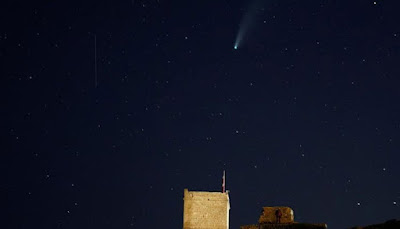If you are an astronomy lover and have witnessed a ball of fire travelling across Maine's skies in broad daylight, it could earn you thousands of dollars if you found one kilogramme of that fireball, reported CBS News.
 |
| The Comet C/2020 or "Neowise" and a meteor are seen behind Ghajn Tuffieha Tower, a 17th-century coastal fortification, at Ghajn Tuffieha Bay, Malta. — Reuters/File |
Maine Mineral and Gem Museum announced on Monday that whosoever brought one kilogramme of meteorite — that was seen travelling in the sky in New Brunswick, Canada in broad daylight on Saturday — will offer a sum of $25,000 as a reward.
The museum noted that multiple sonic booms from the fireball could be heard in Maine. "Nasa Doppler radar detected multiple meteorites from that time", the museum added.
It said in its Facebook post on Wednesday that "There was an extraordinary event that happened in Washington County. A fireball was spotted streaking through the sky — during the day!"
The museum also highlighted that most fireballs are seen during the night when their light is easily contrasted against the dark behind them. This occasion "is incredibly rare", remarked the post.
Darryl Pitt, chair of the museum's meteorite division, said in a statement that "When a fireball is sufficiently bright to be seen in broad daylight, it would have been extraordinarily bright had this been at night."
"The existence of positive Doppler radar returns – meteorites detected descending through the atmosphere just several miles above the ground – assures us there are meteorites waiting to be found."
The offered reward is only for the kilogramme, however, Pitt also noted that "the museum will also buy other fireball pieces that are found."
"Depending upon the type of meteorite this is, specimens could easily be worth their weight in gold," he said.
There were six witness reports were received of the extremely bright fireball on Saturday by the American Meteor Society. Half of the reports received were in northeast Maine.
A witness who saw a meteorite explained it as having a "long glowing tail [but no smoke]." Another said that it was "bright red" while the tail was "very white."
"It was so bright – especially against the clear blue sky," that witness said.
Nasa noted that the meteorite event is the first radar-observed meteorite fall seen in Maine which was observed for just 4 minutes and 40 seconds.
The museum said that "anyone who finds a piece must have it identified with the museum. Appointments to do so can be made with their research lab technologist, Al Falster, and results will take five to ten business days."
"Specimens exhibiting advanced botanical matter are not from this fireball event!" the museum said. "And please remember: you must obtain land owner permission BEFORE meteorite hunting."


.jpg)

0 Comments